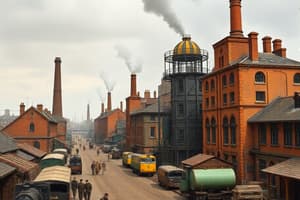Podcast
Questions and Answers
What was the consequence of the transfer of population from the countryside to the cities during the Industrial Revolution?
What was the consequence of the transfer of population from the countryside to the cities during the Industrial Revolution?
- Resulted in an equal distribution of labor
- Led to a surplus of agricultural labor
- Boosted agricultural production
- Weakened the agricultural workforce (correct)
What did the concentration of people in industrial centers lead to in terms of culture?
What did the concentration of people in industrial centers lead to in terms of culture?
- Formation of Working Class Culture (correct)
- Strengthening of Aristocratic Culture
- Promotion of Rural Culture
- Eradication of Traditional Culture
What made 19th century England a dominant force in the world?
What made 19th century England a dominant force in the world?
- Different discoveries, application of science, and involvement of social classes in development (correct)
- Lack of competition from other nations
- Isolation from global events
- Reliance on traditional methods
What did the Industrial Revolution necessitate in terms of workforce?
What did the Industrial Revolution necessitate in terms of workforce?
What did the new vision of industrialization lead to in England?
What did the new vision of industrialization lead to in England?
Flashcards are hidden until you start studying



